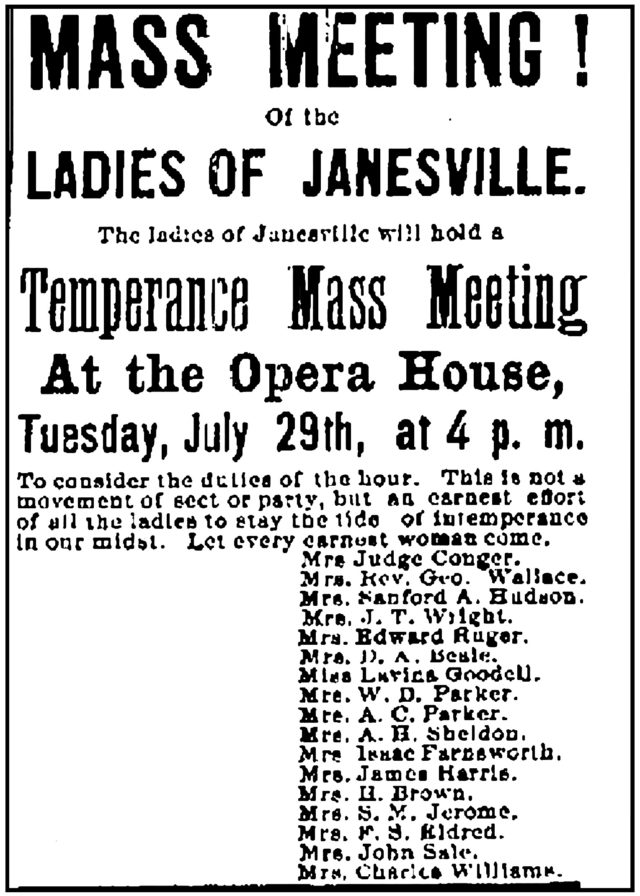“We are marching on.”
Lavinia Goodell, Janesville, Wisconsin, 1873
Do you think women’s marches are a 21st century phenomenon? Far from it. In the summer of 1873, Lavinia Goodell, secretary of Janesville’s newly formed Ladies Temperance Union, helped organize a march to city hall to protest the granting of liquor licenses.
Plans for the march began at a mass meeting at the Janesville opera house. According to an ad Lavinia composed and delivered to the Janesville Gazette, the purpose of the meeting was:
To consider the duties of the hour. This is not a movement of sect or party, but an earnest effort of all the ladies to stay the tide of intemperance in our midst. Let every earnest woman come.

The notice ran in the paper on Monday, July 28. It was signed by wives of local judges, attorneys, businessmen, and ministers. Lavinia was the only spinster on the list.
On Tuesday evening, two hundred Janesville women answered the call and descended on the opera house. Lavinia, who was studying law at the time, gave a statement on the legal aspect of the group’s aim, which in the short term was to persuade the common council to grant no additional liquor licenses and in the long term to pass a law prohibiting the sale of all alcoholic beverages within the city limits. A headline in the Janesville Gazette declared, “Woman’s Will. It is expressed through a Delegation 200 Strong. They Resolve that Janesville has had Enough of this Liquor Business. A War of Extermination Declared.”
The women decided to petition the Janesville common council at its next meeting, which was scheduled for the following evening. The city was divided into fifty districts, and twenty-five women volunteered to canvass for signatures on a petition which read:
We, the undersigned, ladies of said city, feeling a deep solicitude for the well being of all classes of our citizens, and regarding intoxicating drinks as one of the most dangerous evils that now threatens the peace, happiness and good order of this community, earnestly remonstrate against the granting of any more licenses to deal in that deadly poison, which is daily corrupting the morals of the youth, and spreading misery, desolation, and death through the land.
The power for good or evil in this city is lodged with your honorable body; and we pray that you will exercise it in a way that will protect us and our husbands, sons, and brothers from this fell destroyer.
On Wednesday, the canvassers obtained 1250 women’s signatures. Then it was on to the Common Council. According to the Gazette:
A half an hour prior to the assembling of the common council … a delegation of thirty ladies gathered at the parlors of the Williams house with the premeditated intent of marching in a body to the council chamber and presenting a bulky document which they had all day been industriously circulating throughout the city, and to which they had obtained the signatures of wives, mothers and others who live in blissful anticipation of a happier condition. This delegated moral force of the city formed in column at half past seven o’clock and marched down Milwaukee Street to the council room, where extra seats had been provided in anticipation of their coming. Two rows of chairs arranged on either side of the long table which occupies the center of the room were filled by this ardent band of temperance workers, and in the arrangement of the delegation for the distribution of that moral pressure which they had rightly calculated their presence would produce upon the board of aldermanic law makers, they had sufficient tact to place, so far as haste and excitement would permit, their best looking delegates in the front rows.
To the satisfaction of the women, no petitions for new liquor licenses were granted that evening, and the proprietor of a local hotel asked that his license be revoked and the license fee returned to him pro-rata. Some aldermen expressed the wish that other licensees do the same.
Although Lavinia would have liked to see more women participate in the endeavor, she considered it a good start toward the passage of a prohibitory law, and she was happy to see Janesville women’s hesitation about participating in social movements begin to ease a bit :
The ladies are quite enthusiastic in the new movement, and intend to continue and extend their influence by permanent organization and labor. Some of the most conservative among them are a little anxious about their “womanliness,” but they are so much interested in the work that I think they will rather re-adjust their ideas on the question of “womanliness” than give it up. So we are marching on.
Sources consulted: Lavinia Goodell’s diary, July 1873; Janesville Gazette, July 28, 30, 31, 1873; “Women Waking up in Wisconsin,” Woman’s Journal, Vol. 4, No. 33, August 16, 1873; William Goodell’s letter to the editor, Wisconsin Chief, August 23, 1873.








Leader though she was, she wasn’t Janesville’s greatest contributor to the temperance cause, not in Frances E. Willard’s town. https://en.m.wikipedia.org/wiki/Frances_Willard
Thank you for your comment. Yes, no one did more for the temperance cause in Janesville than Frances Willard. Indeed, Lavinia Goodell mentions hearing Miss Willard lecture in Janesville in January 1873 and again in January 1879.
Lavinia was so ahead of her time! I adore her spunk! She was a spunky spinster!